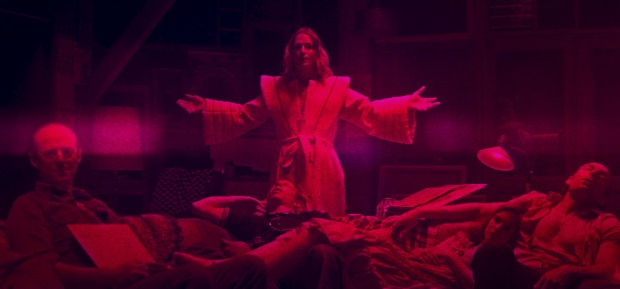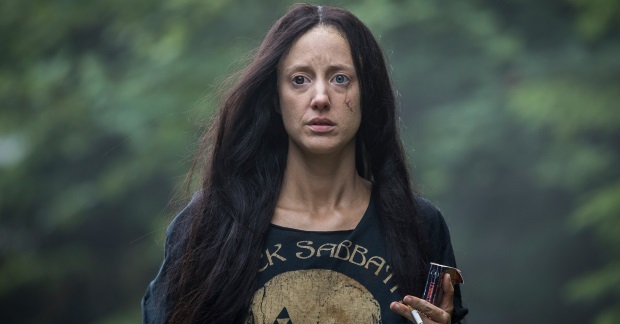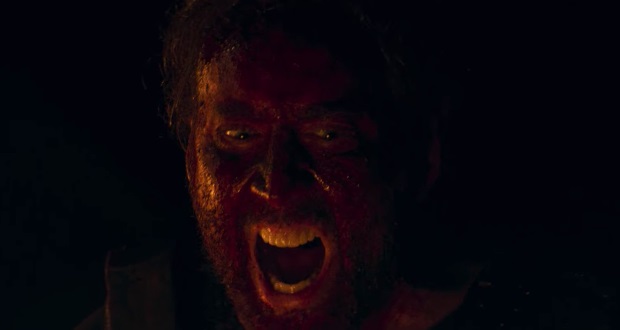Panos Cosmatos interview: I originally rejected Nicolas Cage
The director chats to us about the inspiration behind his latest movie, and some unusual musical influences...
Two features into his directorial career, Panos Cosmatos is already carving out fascinating cinematic territory. Indeed, if the carving done were anything like that in Mandy, Cosmatos’ latest work, it would be straight into flesh and executed by the very sharpest of axes. The new psychedelic action-horror sees Red (Nicolas Cage) take violent revenge on a gang of sleazy cultists who kidnap his beloved Mandy (Andrea Riseborough) from their idyllic cabin in America’s rural north-west. It’s another storming genre banger but an altogether fiercer beast than the Italian-Canadian writer-director’s sci-fi puzzler Beyond The Black Rainbow.
Cosmatos sat down to explain how grief eventually led him to filmmaking, why a dream helped him cast Cage and even reveals an unlikely love of the world’s favourite Swedish pop group.
What element of the story came first?
The idea of making a revenge movie that revolves around a person that’s being avenged as much as the person who’s acting out the revenge and how they’re intertwined. Then, the idea that it will be a concept album or song about that person.
Do you listen to the Barry Manilow song before you made the film?
Yes, I did. I actually really love that song and not only did I listen to the Barry Manilow version, I also listened to muzak versions of it and a panpipe instrumental version that I quite like.
What kind of mood were you trying to achieve?
I wanted to make an extension of Beyond The Black Rainbow (2010) which I think of almost as a musical – a sonic audio-visual experience as much as a narrative film – so I wanted to continue that and take it much further and create a much more grandiose, bombastic rock opera.

The films are of a piece. What was the reasoning behind that?
I realised, in retrospect, because my mother died in 1997, I slow-motion spiraled into self-destructiveness, drinking; And after my father died, which was a long and drawn out traumatic process, I realised I hadn’t dealt at all with the passing of my mother and now my father’s death was going to compound on top of that and destroy me inside, fully.
I went to therapy and was finally able to start purging some of those emotions I had been suppressing and dealing with them and found myself emerging into a state of clarity, at least for the time being. I thing that’s probably gone now but at that moment of clarity I realised that I’d been putting my creative energy into very disparate things like photography, collage and short films. I realised instead of putting all my creative energy in different directions I have to put it into movies.
Do you think filmmaking helps?
I think writing Black Rainbow and writing this film truly was a therapeutic experience. But when I was writing Black Rainbow it was a very intense emotional experience and it was very abstract, that metaphorical way of talking about how I suppressed all my emotions about what had happened with my mom.
I started writing Mandy as an antidote to that, the opposite of that – the purging of the emotions and now the volcanic explosion of all these emotions and being allowed to feel them again. Mandy was the outlet, the flipside of the coin.
Was there any significance in Mandy’s Mötley Crüe and Black Sabbath t-shirts?
They’re two bands that I love. Mötley Crüe was actually my gateway to heavy metal. There was a kid who was older than me at elementary school who I looked up to and i thought was the coolest guy. He was walking around listening to his headphones and one day he showed me this cassette tape of Mötley Crüe’s Shout At The Devil and I said “Those are the ugliest girls I’ve ever seen” and he said “Those aren’t girls, those are Mötley Crüe.” And something in my brain snapped. A switch flipped and I was smitten.

Where did it take you after that?
Nowhere, I stayed on metal forever.
I meant, did you move on to Sepultura, Metallica or other bands?
I think the first music I ever heard was Abba. I took my mother’s cassette recorder and went into the bushes to listen to Abba when I was four or five-years-old. I strangely remember this because I enjoyed listening to Abba so much it made me feel self-conscious, so I took it into the bushes to listen to and I remember my mother finding me in the bushes and saying “What are you doing?”.
Having seen your films I never in a million years would have guessed that.
I still love Abba.
What’s your favourite Abba tune?
It’s gotta be Dancing Queen. It’s the most melancholy, beautiful song ever.
Have you seen either of the Mamma Mia films?
I haven’t actually but I have a feeling I’m going to end up seeing them.
Cults figure in Black Rainbow and Mandy. Do you have a particular interest in cults?
The whole idea to me of people who are pushing their minds and “spirits” to get some kind of belief system is fascinating. I understand how it happens. You feel lost in life and you find some kind of community or warmth and I can see that being what draws people in initially and they feel like they need something to give their life meaning. I think most religious belief structures are essentially like mind viruses.
Why are both your films set in 1983?
To me it was when I was going back Black Rainbow and this movie I remember going to the video store and looking at the VHS art and reading the back of them and imagining what one of these movies that I wouldn’t be allowed to watch would be like. For me, 1983 is a signifier of that, of this imaginary kind of realm where these imaginary films could take place.

Did you have Andrea Riseborough in mind to play Mandy from the start?
Yes. I’d seen her in Birdman (2014) and in the British limited TV show National Treasure (2017) and when I realised it was the same actor I was blown away by the chameleonic transformation. I started to realise I’d seen her in other things and not realised it was her. She was able to transform through all these different characters so amazingly and at the same time I saw in her face she had this almost medieval queen quality about her that I thought was quite striking and seemed right for Mandy.
The part of Red seems tailor-made for Nicolas Cage. Every emotion and every strength of that emotion is there. Was the role always intended for him?
No. The part was always going to be very emotional and somewhat baroque in its style but I think in a more realistic way. But after I realised Nicolas Cage wanted to play that part at first I rejected the idea. But then months later I actually had a dream when I was watching Mandy on a finished film with him starring in it. It was so undeniably striking and compelling to see that, it made me realise that I could do so much with his range and particular set of abilities and his love of doing Dada-esque performances, that we could get into realms even more interesting than I’d originally thought.
Panos Cosmatos, thank you very much.
Mandy is in UK cinemas from today.